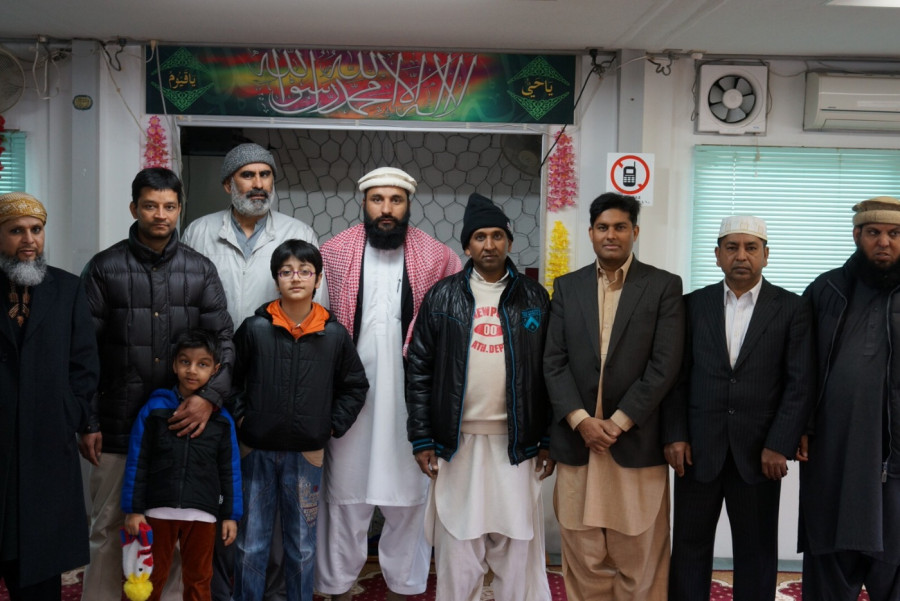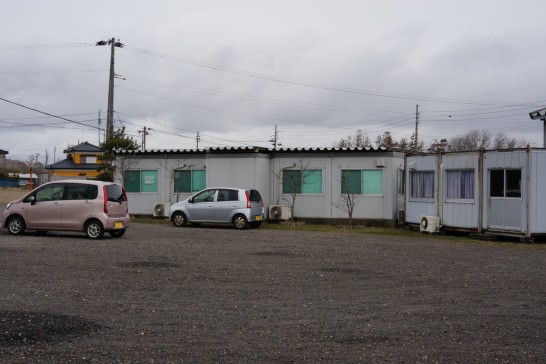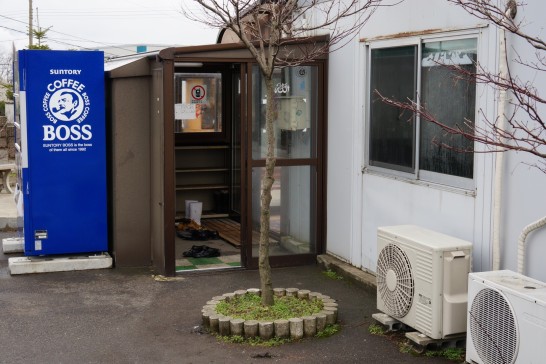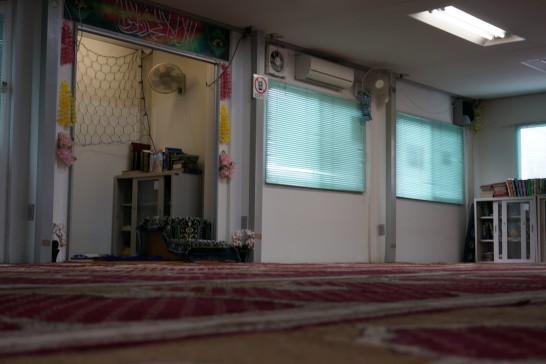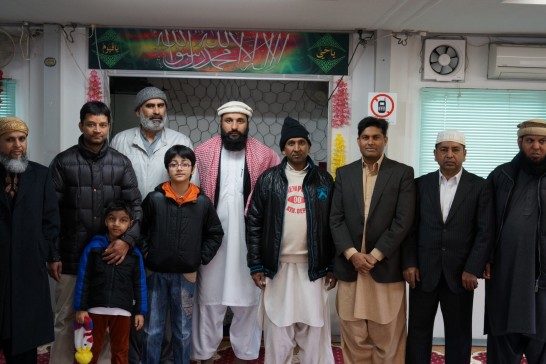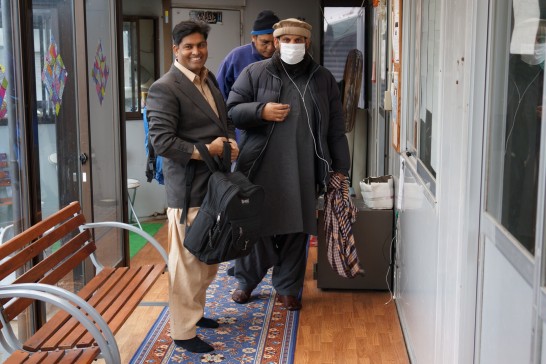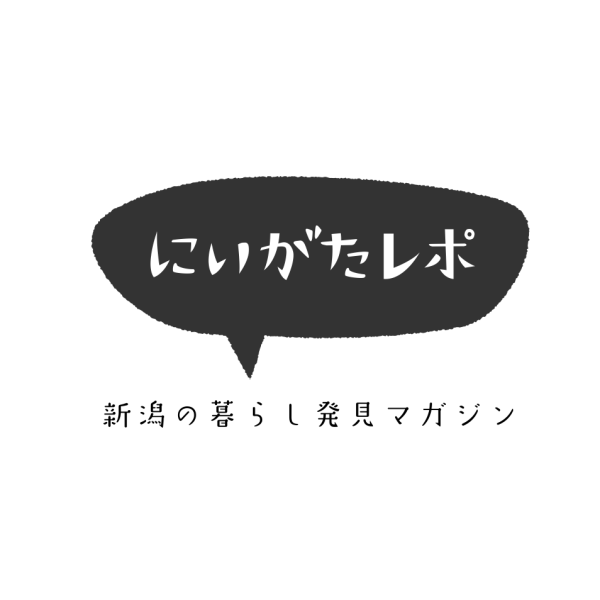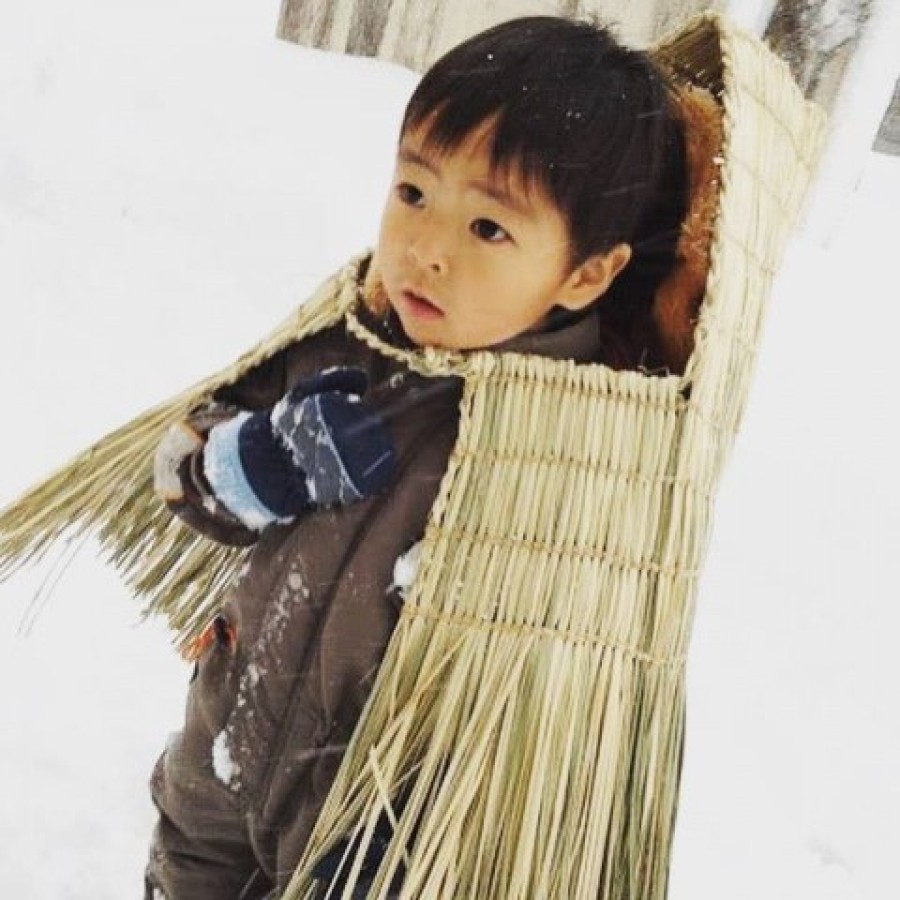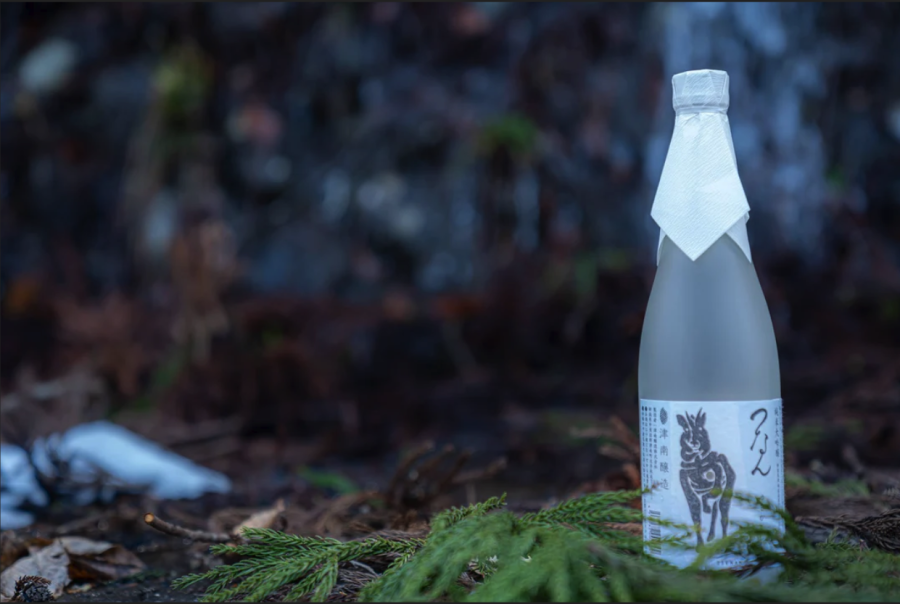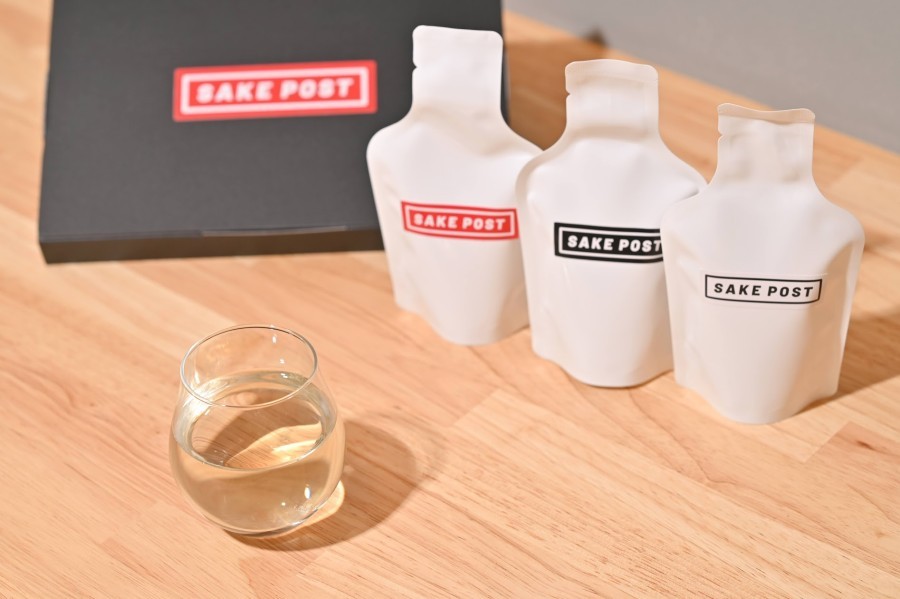Niigata Higashi Port, the only core international port on the Sea of Japan coast, straddling the northern wards of Niigata City and the town of Seiro.
A foreign community exists in and around the area. In a series of three reports, we have spotlighted the foreign culture that has taken root in Niigata.
After leaving the curry shop Nair, we were navigated by Google Maps to an Islamic mosque. Following the directions, we were led to the premises of a certain company in Tarodai.
Hm? I don't see anything that looks like a mosque here, do you?
I parked my car in a nearby vacant lot and wandered around on foot until I finally spotted a green sign that looked like it at the top of a hill. The sign read "Islamic Centre Niigata". This must be the place.
Mosque with the appearance of a prefabricated hut.
entrances
As we entered the premises, we heard the sound of worship. It was just lunchtime, so it seemed to be during the noon service. I thought, "What's going on?", but then several people came out of the building. Perhaps the service had just finished. I spoke to a young man of high school age who came out of the entrance.
-Hello. Have you finished the service?
If the person:????
It's a bad situation, a complete away-from-home situation. It's as if you've wandered into some foreign countryside.
But undeterred, I did it again. This time, I asked another young man. However, this young man came to me in broken Japanese and said he did not understand Japanese.
I had no choice but to speak to the first young man again.
Young person: yes, I've just finished.
Oh, I got through properly.
Can I come in? I asked, and they smiled wanly, neither confirming nor denying, so I decided it was okay and rushed into the entrance. (But the Pakistani youths were all quite good-looking. (But the Pakistani youths were all quite good-looking.)
The front door is crammed with shoes. How many people are in there?
My body started to shake somehow. I fearfully took off my shoes at the entrance and went inside. A middle-aged man with glasses and a large physique turned his gaze towards me. I gave him a Japanese basho (thank you, thank you) and pushed my way down the corridor, conscious of my low posture. Surprisingly, this works. Let's go with confidence, this is Japan.
There was another door at the end of the corridor and beyond the door I could see a large group of people gathered in a large hall for Islamic prayers. As I was about to enter, the bespectacled man from earlier stopped me. He spoke proper Japanese.
Representative man: 'I'm still in the middle of the service, so wait until afterwards. I am the representative here. If you have any questions, you can ask me later."
So I decided not to go up to the hall, but to stand in the corner of the corridor and listen to what was going on. Muslims (almost all of Pakistani origin) came out of the hall towards the corridor after prayers.
I was a little surprised to see an unfamiliar Japanese person standing there and walking towards the entrance. I would say assalamu alaykum with a nod of the head when my eyes met theirs. Some people came over to shake my hand. I think my handshake was an afterthought, but I thought the culture of shaking hands even with people you have never met before was wonderful.
Well, that's a hell of a lot of Pakistanis! 'What is this place, really Niigata?' I couldn't believe my eyes. When I looked closely, I saw that they were all handing over notes to the representative man on their way home. I wondered if they were making a donation or something.
I was tired of standing there, so I decided to sit on a couch by the corridor and wait. Then a young boy of junior high school age sat down next to me and I spoke to him. I spoke to him in English, but he didn't seem to understand Japanese.
―How old are you?
Boys: Fine.
I misheard 'Fine' and 'Five' and asked again 'Five?', meaning that he didn't look very five years old. Another young boy who was listening to the exchange came over and seemed to be saying in what sounded like Urdu, "How old are you?
So the boy I asked the question to seemed to realise his mistake and answered again, 'Fourteen'. Some of my fellow junior high school students were fluent in Japanese, while others did not understand Japanese at all. The boy I spoke to was a Pakistani born in Pakistan who did not understand Japanese at all. The one who spoke fluent Japanese told me that her mother was Japanese and she was born in Japan.
While I was getting excited like that, the representative guy warned me about something in Urdu. He said he had been making a bit of noise.
When most of the worshippers had gone, I opened the door and went inside. The floor was carpeted and there was a small room with a slightly recessed floor plan at the front.
Great hall. Carpeted place of worship.
There were still a few people left in the hall, talking about something amongst themselves. As I stood alone in a corner of the hall watching the situation, one of the group who had stayed behind to talk came up to me and asked me an interesting question in Japanese.
Man: Where are you from? Eh? Nishi Ward, Niigata City? What do you do? Are you from the police? Or are you from the Ministry of Justice?
I raised my hands in a frightening manner and said, "I am just a company employee, a civilian~" and the man looked relieved and left.
I'm being very paranoid! Well, that's understandable. If I was scared, they must have been just as scared.
The next man who spoke to me was quite a talkative anchan. Moreover, he could understand my Japanese almost perfectly, so I was grateful. So I was spoilt and asked him a lot of questions.
-Are you all from Pakistan?
Anchan: That's generally true. There are also Indian, Malaysian, Sri Lankan and Russian Muslims.
-Do they all live in the same area?
Anchan: They come from all around Niigata City, not only from this area. By the way, the representative here lives in Kameda.
-I see. But there are a lot of Pakistanis around here, especially in the East Port area. Why is that?
Anchan: You have the Russian route. That's why Pakistani people are coming here in connection with the export of used cars.
-Umm, I know there is a Russian route and a lot of Russians come here because of the export of used cars, but I don't understand why Pakistanis come here.
Anchan: The used car business is a Pakistani livelihood. We do it all over Japan through a network of Pakistanis. But out of all the places in Japan, they come here to Niigata's Donggang port the most. This is because the used car business is easiest here in Donggang because of the Russian shipping routes.
-Are they from all over Japan in Donggang? That's amazing. Do you have frequent exchanges with the Pakistani community in Tokyo, for example?
Anchan: Of course. But not only in Tokyo. The Pakistani network is worldwide. All Muslims are brothers and family members, so the circle of mutual help is worldwide.
Thanks for all the information, Anchan.
After a while, a representative man arrived. I don't know what it was, but they decided to take a commemorative photograph, and I was included in the group. In return, I offered to be photographed.
Commemorative photo. Yes, cheese.
Apparently, today was a farewell day for the person who was leading the worship service before he temporarily returned to Pakistan. The representative then sat down in a corner of the hall to talk to me. I told him that I had been interested in this mosque for some time and that I was writing an article about it for Niigata Repo. Upon hearing this, the representative said, "By all means, write an article about it".
He then showed me several Islamic Korans. Some of them had commentaries in Urdu. I had dabbled in Arabic when I was at university and could recite the first chapter of the Koran. When I demonstrated this, the representative praised me, saying I was quite good.
The representative man's name is Khan Malik, an intellectual who holds a PhD from the Faculty of Law at Niigata University. He said that the mosque is now a prefabricated hut, but in the future they plan to build a mosque on the same site, with a magnificent structure. So everyone was donating money on their way home.
-There seem to be some people who can speak Japanese and some who cannot.
Malik: Those who are married to Japanese wives and settled in Japan speak good Japanese. Some of them were once married to a Japanese but unfortunately divorced and returned to Pakistan temporarily, remarried in their home country and then re-entered Japan with their families. In such cases, the family members cannot speak Japanese at all. However, there is no one among us who has overstayed because their visa has expired, so don't worry.
Haha, I see. I've just been in the curry shop 'Nair' as a customer, Malik-san. Malik, Anchan and all the other Muslims who spoke to me so kindly, thank you so much for your kindness today. We thanked them and left the mosque.
View of the mosque corridor. 'It's cold in Niigata, isn't it?' I'm used to it," he smiles.
Well, that's the end of the first part of the Foreign Culture Assault Report around Donggang, for now.
On the way home, I dropped in at Plant 4 in Seiro Town, where many Russians are said to come to shop, but I didn't see a single customer who looked like that. That's strange. There must have been quite a few when I visited a few years ago. As the owner of Iura Shoten said, did a considerable number of them leave the country because of the increase in customs duties?
This is why we were unable to make contact with Russians this time. Next time, I would definitely like to infiltrate the Russian community.
Spotlight.
Niigata Mosque
- 2557-1 Tarashiro, Kita-ku, Niigata City
- TEL/FAX 025-255-3567
advertisement


